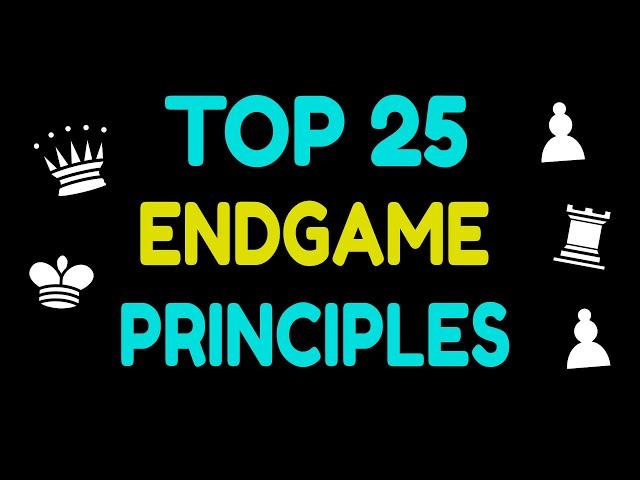
Top 25 Chess Endgame Principles - Endgame Concepts, Ideas | Basic Chess Endgame Principles and Plans
Комментарии:

Most important endgame principle is to buy your opponent a drink! 😂
Ответить
The last part has to do with parity, a move that always and only alternates square colors. If rooks can only move one square vertically and horizontally, it can’t lose a tempo. It something have to do with the number of moves being an odd number in taxicab distance.
Ответить
The amount of choke I did during endgame really made me go back to learning this basic principles. The pressure when I'm up a piece during endgame somehow made me more nervous.
Ответить
Very nice Video, friend
Ответить
Let’s get him 1000000000 instead
Ответить
your friend from Zimbabwe is so fucking funny pro. it's crazy to gain elo while laughing your ass off too
Ответить
Please teach me how to win a game with only king left 😂
Ответить
Great video
Ответить
Great video for beginners! By the way the correct German pronunciation of Zugzwang is with the a pronounced as the a in the name Raheem and not the a like in dang or fang.
Ответить
Very best trick principles in end game 😊😊😊😮
Ответить
1. Watch out for stalemate
2. Activate your King
3. Centralize your king
4. Passed pawns should be pushed
5. Try to create passed pawns
6. Passed pawns should be supported
7. King and Queen checkmate idea
8. King and Rook checkmate idea
9. Two bishops checkmate idea
10. Knight and Bishop checkmate idea
11. Two Knights checkmate idea
12. Flank pawns are hard to stop
13. 2 connected pawns on 6th rank beat Rook
14. Advanced pawns are more valuable
15. Opposition is more important in King and Pawn endings
16. Rooks go behind passed Pawns
17. Connected passed Pawns are best
18. Opposite colored Bishop endings are drawish
19. Bishop is better than Knight with Pawns on both sides
20. Watch for perpetual check in Queen endings
21. Cut off opponents King in Rook endings
22. Put Rooks far away from other pieces
23. Wrong Bishop and flank Pawn is a draw
24. Zugzwang!
25. Knights can’t lose tempo

2 nights vs pawn sometimes night forced win
Ответить
TEEST
Ответить
Hi, Can you show an ending with white rook and 2 pawns and black bishop and 1 pawn
Ответить
A night won't be able to lose a tempo, because it always moves to a different square color.
For a night to lose a tempo, it'll have to end at the same square color that it's on now.
That has to be an even amount of steps.
Being even, the opponent will also be able to move an even number of moves, stopping you from taking any advantage.

The pacing of your videos is fantastic! I just discovered your channel and I'm really looking forward to watching more!
Ответить
Thanks! This was very useful!
Ответить
I can see now that Bishop is better than Knight because of the end game, and 2 Bishop can win a game, but if U have 2 Knight you can't win at the end of the game
Ответить
I usually don’t comment. But I would like to see you analyse latest grand master games.
Ответить
I would literally die if I had to execute a knight/bishop checkmate. That's too complicated
Ответить
As to the last tip, that’s not technically true - unless I’m missing something. If the white night and black king are on the same color square and it is white’s turn, then yes, stalemate will happen as described. And that is because the knight always changes the color of square when it moves and the black king, in this example, is also always changing square color. BUT, if the white knight and black king are on different color squares and it’s white’s turn, then white can defeat black. Or, if those pieces are on the same color square and it is black’s turn, then same thing.
Ответить
BTW in last rule knight can lose tempo
Ответить
You said K+N+B against a king is very rare, but last summer I did a tournament and I saw it twice, including one of my own games. My opponent knew how it works, so I lose. Also last october I saw it in a youth tournament.
Ответить
Knights can't attack the same colour square in successive moves which is why they can't lose a tempo.
Ответить
Americans say "Sugswang"¿? Can't you guys say Zugzwang??
Ответить
You're good at teaching. You explain showing what you mean, you're a natural at what you're doing!
Ответить
This is dumb
Ответить
Not being able to lose tempo with the knight is due to the fact that on every move it switches between light and dark squares. So you can never do an odd number of moves that would cover the same square.
Ответить
Excellent presentation with just enough examples to get us thinking about it on a deeper level. Thank you!
Ответить
Why stalemate is considered a draw instead of a win is beyond me, and it is one of the things that makes chess less fun for me.
Ответить
Great video!
Ответить
Thanks!
Ответить
These videos are excellent, thanks!
Ответить
I had the king and rook endgame vs the Michaelangelo bot in the chess app. That game I learnt about stalemate draw from not winning in a certain amount of turns. I was so upset but I finally beat him the day after :)
Ответить
Thanks.
Ответить
Have been learning through all your videos ever since I was a beginner with an ELO rating of 800 but 1 year ago now am an an expert (2050) because of the videos
Your videos are really helpful more especially for beginners and advanced players
I would like to thank you once again for your effort that has helped me become almost a chess master

I want top 35 opening principles😢
Ответить
The knight can not lose a tempo because it always moves to a different colour square: light to dark or dark to light.
In order to attack a specific square, say dark, it has to be on a light square.
But it can only move to a light square from another light square in an even number of moves. Never in an odd number of moves.
Hence, it can't lose a tempo

Your videos are excellent! Thanks so much!
Ответить
For the first principle, I would’ve gone for the steamroller mate by moving the bottom rook to column A.
Ответить
Very useful
Ответить
I know this is an old video, but just want to say thanks for all the free advice you have given me.
At my level ( 1250 to 1350) i have found your videos the most helpful.

him: explaining
my ocd ass obsessing over the fact that his head is not centered in the frame.

Thank you, this has been really helpful. I would just add to tip 15, there are two types of opposition. Tip 15 covers direct opposition well, when the kings are close, but you may also need to understand distant opposition for situations when the kings are not close.
Ответить















